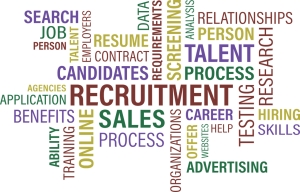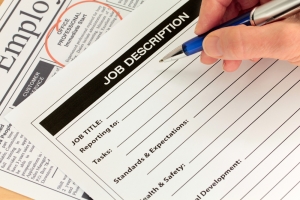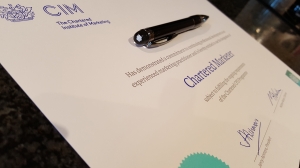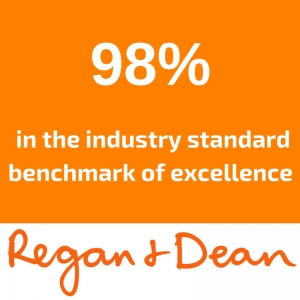Chris Potter
Why should I consider jobs in B2B marketing?
Let’s be honest, business to business (or B2B) marketing has often been seen as the less glamorous cousin to FMCG marketing. Indeed, FMCG marketing (or to be more specific, advertising) forms what the general public considers to be “marketing”. And so, new graduates battle for places on Unilever’s legendary marketing training programme in the hope of securing a future in marketing to consumers.
Which is great news for those people who choose to specialise in B2B marketing, where there are more opportunities often at attractive salaries. And for those who relish this part of marketing, B2B roles are just as challenging and require just as much creativity - and arguably more so: how do you differentiate one business law firm from another?
In fact, some of the differences between B2B and FMCG marketing are gravely overstated and nowhere is this more true than in the tired old maxim that FMCG consumers buy for emotional reasons, whilst B2B buyers are rational.
What nonsense! As the marketing guru, Drayton Bird, once wrote, a B2B buyer is just a consumer in a suit. And he or she will face all sorts of emotions when making a purchasing decision: Will this make me look smart in front of my colleagues? Will it help me get a promotion? What will happen to me if it doesn’t work? Will my boss bawl me out if I don’t buy it and our competitors do?
Indeed, some people now suggest we redefine all marketing as H2H marketing: Human to Human marketing.
There are, however, some opportunities and challenges that are greater in B2B marketing which might make a career in this area more appealing:
Multiple stakeholders
Having argued the case for emotion in B2B buying decisions, it is true to say that any decision needs to be seen as rational and balanced by the firm’s shareholders and the individual’s boss and colleagues. Ideally there needs to be a clear and positive return on investment on the purchase for it to be seen as rational.
Moreover, many business purchases - particularly large ones - will involve more than one decision maker and the marketer finds themselves needing to consider their differing needs.
These decision makers may include procurement professionals, perhaps the closest to the rational buyer you’ll ever encounter and considered by many to be particularly tough nuts to crack.
The importance of relationships
For the reasons described earlier, it’s essential that a relationship of trust is developed between supplier and client in many B2B relationships. In spite of all the talk of one-to-one marketing in consumer markets, few consumer decisions compare with the magnitude, implications and value of B2B contracts.
So B2B marketers will often find themselves involved in establishing and nurturing trusting relationships between their firms and potential clients long before a sale is made. This process often means getting involved in events, content marketing and thought leadership, creating case studies and testimonials, PR and communication strategies.
Complexity and Intangibility
While a B2B item to be used in a manufacturing process, such as gear bearings, will often be a matter of specification and QA, many marketers in the B2B space are marketing professional services, which are often complex and intangible.
This challenges the most experienced marketers as it requires copy, collateral, materials and strategies that communicate the benefits of the service in an accessible and persuasive way that differentiates them from the competition.
And because services are very difficult to compare without experiencing them, the responsibility for putting together the most compelling argument falls on the shoulders of sales and marketing.
Sales vs Marketing
As we’ve mentioned sales it’s worth mentioning that in B2B markets, marketing tends to work hand in hand with a sales team. And it’s a relationship that isn’t always easy. When times are tough sales can accuse marketing of not providing the right leads, while marketing claims the sales team are poor at converting the leads provided.
Successful B2B marketers work closely with the sales teams, finding out about their needs and helping to fulfil them in a collaborative way.
Concentrated Purchasing Power and Longer Relationships
The Pareto Principle comes into its own in B2B markets. There are often relatively few buyers out there and of those, 20% are responsible for 80% of buying decisions. And once they buy B2B buyers tend to establish longer term relationships with suppliers than the more brand promiscuous consumer.
So get it right and ensure the client is satisfied and the returns are potentially huge. But the flipside of that coin, of course, is that the consequences of getting it wrong are significant.
In short, it would seem the B2B environment is more challenging and the customers more demanding. And while many marketers will relish that, others might ask about the benefits of taking on the challenge. Here are four:
1 Power
You’re more likely to be a big fish in a smaller pond in B2B marketing, getting involved in key decisions, finding sales opportunities and determining the best strategy to use to develop the business.
2 Money
You can expect rewards for your efforts, if you meet targets. As the value of each individual sale is greater than that in consumer markets, so a few wins can make a big difference.
And because the talent pool of candidates interested in B2B marketing is sometimes a bit smaller, firms are willing to offer attractive salaries to attract the best people.
3 Reward
The line of sight between your marketing activity and business results is less ambiguous in B2B markets. Indeed the results on the bottom line can be measured and reported on with relative ease. This can be massively satisfying for those with drive and ambition - and looks great on the CV.
4 Variety
You’re likely to get involved in a wider range of marketing activity in a B2B marketing job. Indeed, in a smaller firm you may be a one person marketing team covering everything from social media management and simple design to strategy development and lead generation. It’s an exciting prospect for the marketing generalist.
B2B marketing is an excellent option for many marketers, whether new to the workplace or those who are experienced and want to try their skills in a new environment. Consider whether a B2B marketing position might be right for your next move.
At Regan & Dean we recruit for a really interesting selection of B2B marketing roles from a broad range of sectors - from financial services, to Associations and B2B publishing/media companies. Candidates we speak to enjoy marketing to the corporate world and have made a conscious decision to build their marketing career in this area. It’s no less strategic and, in fact, in many cases more targeted, and it has to use the latest marketing techniques to create stand out in the professional world.
We’re pleased to have built a reputation with our clients in providing clever, innovative B2B marketers - and look forward to continuing working with our clients and candidates in this dynamic and challenging sector.
Why do I never get feedback from job interviews?
“If I spend £22 to travel to your London office twice while I'm unemployed,” wrote an exasperated user of LinkedIn recently. “Please have the courtesy to at least give me a call, send me an email or even send a messenger pigeon to tell me that my interview was not successful.”
Unfortunately, it is all too common these days for interviewees to find themselves wondering whether their interview notes have disappeared into a black hole. The interview may have appeared to go quite well – but then you hear absolutely nothing back, beyond whether or not you got the job. And sometimes not even that!
The context
Unfortunately, while standard HR policies will always have giving feedback as part of their process, your interviewer may often be a line manager, without formal interview training, and for whom interviewing is not part of their ‘day job’. With their very pressing, wider responsibilities often taking priority, your notes can quickly disappear under their pile of ‘need to do’ activities. It might be that the individual doing the recruiting is disorganised, has interviewed too many people to keep track of, or simply doesn’t understand that feedback is key, and hasn’t thought about taking time to do this.
So, what can you do to minimise the potential of this happening for you in the future.
Clarify the process early on
It’s always a good idea to raise it yourself as part of your overall interview process.
If you are dealing with an employer directly you could ask, as one of your closing questions at interview, what the process will be. Emphasise your interest in getting any feedback as to your overall interview performance if, for example, you haven’t had much interview experience before). If you are not successful, ask as well about any areas that the interviewers may feel are ‘development areas’. It’s a great opportunity to stress how keen you are on developing yourself and taking on board any advice to help you be successful in your chosen career.
This shows good self awareness and an interest in personal development. All great characteristics for a new employee! For an interviewer to hear how much you would value their input can also be flattering for them too, so may also encourage them to take extra interest in giving their feedback.
Show enthusiasm
If you show a general lack of enthusiasm during the interview, the interviewer probably won’t be in too much of a rush to offer you feedback. They may feel that you won’t really care anyway, so why bother? You may really want the job and your lack of enthusiasm could be a sign of nervousness or even professional self-restraint, rather than disinterest, but it is worth doing a bit of self-analysis.
The interviewer wants to see that you are excited by the opportunity, so it is important to make this show during your interview.
Follow up
Everyone is busy these days and quite often, interviews come and go so quickly that the interviewers completely forget to provide any feedback. It may be that the company doesn’t have a standard process for providing feedback, so if you don’t bother to follow up, you won’t find out what happened and where you could have done better.
If you have applied for the role directly with the employer, it is a good idea to send an email after your interview to follow up and reaffirm your interest, as well as to thank the interviewer. You might specifically include a note about how much you would value their general feedback as well as, of course, hearing the decision they are making.
If you don’t hear within a week after the interview, it is important to follow up, unless you have been specifically told it will be longer.
Your agency
If you use a recruitment agency for your job search and they repeatedly fail to provide feedback, despite your follow ups – it could be time to think about using a different agency.
The agency’s role is to act as the go-between - they should be keen to ensure the client gets the right candidate, but also that their candidates get as much as possible out of the experience, particularly if they are unsuccessful, to help them in the future.
Feedback is vital in order to be able to grow and develop and it is the responsibility of the agency to try to make this happen. It is bad practice not to provide feedback after an interview and a good agency will do their utmost to make sure this happens by chasing the company on behalf of their candidates. They may sometimes be frustrated but, if they are a reputable agency, they will always try.
Rules are rules
In an increasingly litigious world, some employers unfortunately can have a rule that they will not provide feedback, in case it is used by the applicant as evidence of discrimination. “It’s company policy,” they will say.
One way of addressing this is, rather than ask why you didn’t get the job, is to ask for any tips on how you might improve your interview technique in the future. There’s no guarantee this will work but it’s worth a try.
Don’t argue
If you do get feedback - do take it well. Don’t make the recruiter regret providing feedback by arguing back, tempting though this may be. The fact is, the decision has been made and unless the interviewer has been left with a fundamental misunderstanding of you which may be damaging to your reputation, arguing the point will most likely do more harm than good.
Take feedback on the chin, and where it is fair, learn from it and aim to address it next time.
So in summary, if you don’t get feedback, comfort yourself in the fact that it is almost certainly not your fault. But also do make sure you’ve done what you can to show that you’re keen and open to having it.
You may also want to make sure you are supported by an agency that always works hard to get useful, constructive feedback for its candidates.
An agency like Regan & Dean.
So, you’ve made a big mistake at work and you’re worried that this will be the end of your career forever and you’ll never be given responsibility again.
It’s not just a regular mistake – this one is huge, so what do you do?
The quick answer to the question “is my career over?” is, almost certainly not. Unless you’ve done something deliberately fraudulent, criminal or that negligently put lives or people’s security at risk, your career might suffer a stall or a sideways move, but it is very unlikely to be over. But equally, it just might give your career an unexpected boost.
The first thing to remember is that everyone makes mistakes. Unfortunately though, some companies have a serious blame culture and if you know this to be true of your organisation, you are probably more worried than you would be in a more forgiving environment. If this is the case, you might want to think about whether it is the best environment for you and your development.
Whether you work in a positive or negative culture, you’ll definitely need an action plan to deal with your mistake positively, no matter how big it may be.
How to deal with it
As with many things in life, in most cases the mistake is less important than the consequences and how you deal with them. There are two things you should not do if you make a mistake: pretend it didn’t happen or try to blame someone else.
Let’s say you’ve arranged a massive event, but realise you have forgotten to send out the invitations when you were supposed to. The event is in less than a week and you’ve just realised. It was on your list of things to do, but in the rush of everything else – you haven’t done it.
Ok – it’s a major mistake, but it’s time to own up. You may be tempted to blame the intern, or the wider situation, but always take responsibility for your own actions – be open and honest.
It’s helpful at this stage to think about ways the mistake can be rectified rather than presenting a problem with no solution. So take responsibility for the mistake, and for thinking of ways to deal with it.
The conversation
Perhaps the hardest part of making a mistake is telling your manager, but this has to be done - and it has to be done quickly and unambiguously.
He or she will either react really badly or they will try and find a resolution. A good manager will focus on the issue and try find a solution with you or for you. They won’t just leave you to pick it up.
Find a confidential space where you can talk and succinctly describe the issue. Take responsibility and say you are willing to do what it takes to put it right. Perhaps propose some initial thoughts you’ve had get things back on track. Listen to their advice and remember, your manager or leader is paid a higher salary to pick up the pieces when things don’t go as planned. They may give you a greater sense of proportion; a mistake that feels catastrophic to you might seem a minor inconvenience to her or him.
In the case of forgetting to send out invitations, your manager may suggest that you get all hands to the pump, making calls and doing the very best to fill the event. Everyone would work together to deal with an issue like this.
If you do find that your manager is focused on blaming you, rather than finding a solution, it may be time to look at working in a different culture. Blame cultures are not healthy.
In some roles, you may need to report your mistake to the client and broadly the same rules would apply, except the onus is on you to provide the solution. You need to make the call - or meet - as soon as possible but not before you’ve thought through how you’re going to address the error.
That way the conversation can start positively, “Ken, I’m calling you because I promised the invitations would go out two weeks ago. That didn’t happen and I wanted to explain why, and what I am doing right now to put it right.”
Learn from mistakes
The internet is littered with quotes about the positive side of mistakes. One of my favourites comes from the man behind the Dilbert cartoons.
“Creativity is allowing yourself to make mistakes. Art is knowing which ones to keep.”
Scott Adams
The consistent theme that emerges from these quotes, is that everyone makes mistakes but wise people see them as a learning opportunity.
One of the key mantras in marketing is to Test, Measure, Adapt. Try something, see if it works and then tweak it and try again to see if the result improves. So there’s always a degree of failure to contend with. Indeed some people see failure as the most powerful form of personal development, as it demonstrates you are pushing yourself to your limits. Most very successful entrepreneurs have made some very big mistakes along the way.
Although you don’t want to get into the habit of making mistakes – you shouldn’t fret too much about them either. But do reflect. Keep a learning log, which details your mistakes (along with your successes), what you have learned from it and what you’d do differently next time. At the very least you’ll end up some excellent model answers for competency-based interview questions which ask about how you have dealt with challenges.
Use your reflection time to consider if you have any gaps in your skills or knowledge you can work on or work around. If you forgot to send the invitations because you weren’t on top of the project, perhaps you need to go on a project management course. And if you were just too busy you might want to learn how to delegate more effectively. Or, it might show wider structural resourcing issues that you and your manager need to address.
Mistakes can have a positive effect on your career, so whatever you do, do learn from them.
And even better, learn from other people’s too!
How to deal with a nervous interviewee
Interviews can be nerve wracking for inexperienced candidates, and even some people who have reached senior positions in marketing or events might not relish the prospect of being interviewed. Programmes like The Apprentice, in which aggressive interview tactics seem to be the norm, can create a sense of fear around the process which, we believe, is counterproductive.
If, like us, you believe the objective of an interview is to get the best out of every candidate, and identify the best possible candidate for your role, you won’t want to miss out on a star because of a few short term nerves. If you’ve already been impressed by their CV, the chances are he or she can do the job and the interview presents an opportunity to understand the person.
Over nearly 30 years of interviewing, the consultants in Regan & Dean have a lot of experience of bringing out the best in nervous interviewees so that our clients have the best choice possible.
Here are 5 ideas that work for us.
Small talk
A short preamble chat about the candidate’s journey or the offer of a glass of water might sometimes feel like time wasting, but it will allow the candidate to relax into the environment and give their best. Stick to neutral questions, avoiding politics for instance, otherwise the candidate may think they are being tested and become even more stressed.
The general interests section of their CV might be a good place to look for inspiration for small talk. Another great opener can be asking if they have experienced many interviews to date - this has the added benefit of giving them a brilliant opportunity to share their sense of nerves if they are suffering (particularly if they are new to interviews), and set it to rest at the outset of the interview with a little empathy and encouragement from the interviewer.
Start slowly and build
The interview should be a gradual process which starts with some simple questions and then you can work towards the more complex, detailed areas. This will allow the interviewee to get comfortable and find their voice early on in the simple things - so you’ll get more useful information from them in the long run being more relaxed and confident when you get to the finer detail.
Open questions
Nerves can be expressed in many different ways and some candidates will seem withdrawn. If you’re struggling to get a response from your interviewee, try slowing down the pace of your questions and make sure they are open ended. For example, ‘what do you enjoy most about working as part of a busy marketing team?’, rather than ‘have you ever worked in a team?’
Always give the interviewee time to consider their answer, and use probing or examples to get to the detail.
Ask about their portfolio
You will often find that even the most nervous marketing or events candidate will come into their own when you start talking about their creative or events work. Events and Marketing people are always proud of their work and are passionate when they start discussing it, so this is a great way to break the ice and help the interviewee relax.
There’s little more disappointing than taking a portfolio to an interview and not having the chance to show it off. So do ask to see it unless you are very pressed for time.
Be straight
Sometimes talking very directly can get interviewees back in the zone. If, despite all your best efforts, you cannot get the responses you need from the candidate due to their nerves, you might say, “I can see you are very nervous and that’s fine. But I’m keen to see the best side of you. Are you OK, and happy to continue?”. Showing empathy, and a keenness to give them the best chance possible can go a long way to relaxing a candidate. Allowing them a moment to take a breathe and refocus, can really help get them, and the interview, back on track.
If you have been recruiting via a reputable events and marketing recruitment specialist like Regan & Dean, we will always have taken the candidate through initial interview and helped them prepare for their conversation with you. We cannot promise there will be no nerves, but the odds are greatly reduced.
And finally ….
Your feedback is really valuable ...
If you do feel the candidate’s nerves did get the better of them, then do share that with us as their Consultants as part of the interview feedback - and we can work with them to give them strategies and support to help them manage it better next time.
And, most usefully, if you noticed they were nervous, but saw how they managed to control it and were impressed by that, that is brilliant feedback to get back for a candidate - they’ll value it, and it will most likely help them be much more confident in themselves for future interviews. And finally put those nerves to rest.
When it’s time to move on from your current marketing role, you may not be sure where to begin with your job search. After all, it’s not something you do every day, and if you’ve been in your current role or organisation, the recruitment landscape might have changed significantly in the meantime.
By working with a reputable marketing recruitment agency, you can be sure of expert advice and support from people who do this day-in-day-out.
This is not to say you should only look for a role via a marketing recruitment agency, but it is a good idea to include one or two in your job search strategy alongside networking, direct application and responding to marketing positions advertised online or in print.
Here’s why:
They’re proactive when you can’t be
Looking for that ideal opportunity can be very labour intensive and this might be difficult to fit alongside a full-time job. Of course, you need to be an active participant in your job search, but the best agencies will always be looking for roles that might appeal to specific candidates and they can alert you about opportunities you might otherwise miss. At the very least signing up for job alerts with the agency means you’ll get the latest roles hot of the press sent direct to your inbox .. no more searching!
Click here to sign up for our Job Alerts.
Access exclusive roles
Specialised marketing recruitment consultants spend a lot of time building relationships and expertise within their industry and this often allows them exclusivity to roles. So they can often provide access to exclusive roles (or companies) which may not be advertised anywhere else.
Some organisations may consider your CV, even if there is no open opportunity, if you come with a good recommendation from the recruitment agency.
Assistance with CVs and Interviews
A good marketing recruitment agency will help you hone and shape your CV, and give you interview tips and company insights to help improve your chances of securing an interview, and ultimately that new marketing role. As recruitment agencies build long-term relationships with their clients, they gain a deep understanding of their quirks and expectations and you can use this information to help you secure the role.
Expert sector knowledge
Specialised marketing recruitment agencies have expert knowledge in the industry and can advise you on roles that you might not have considered, but will suit your skills and experience. The best agencies will help you think through your long-term career plan and the steps you need to take over the next few years.
Negotiation skills
If you’re offered a new marketing role, you may feel apprehensive about asking for an improved package and this is where recruitment agencies can be useful. Candidates tend to feel more comfortable speaking to recruitment consultants about their expectations, rather than talking directly to the employer. The consultant can advise whether your request for an improved offer is likely to be considered and will present it to the employer on your behalf.
Remember, good recruitment firms want to make sure both sides are happy with the end result, so they are well placed to find a mutually acceptable settlement.
Cost free
There is no reason not to include a recruitment agency to find your next marketing role, as the service is completely free of charge. If any agency tries to charge a fee for representing you, you should not work with them. Agencies get paid by their clients not their candidates.
To reiterate, we do not suggest you should only use marketing recruitment agencies in your job search but there is no reason to exclude them. Choose the firms you want to work with carefully and stick to specialists who understand your profession and who can demonstrate they will represent you positively and proactively.
Naturally, you should start with Regan & Dean. We have a specialist division focussed on roles in marketing, and with consultants who have the depth of knowledge and expertise to understand your skills and experience - and always working on a steady flow of exciting new marketing roles.
6 ways to boost your creativity
Poor marketers! Under constant pressure to be creative throughout their careers, little wonder that writer’s block or designer’s dilemma kicks in from time to time. So if your creative juices have dried up recently, try some of these ideas.
1. Change your environment
Therapists who work with people who have difficulty sleeping have a number of ways to help their clients drop off, and several of them are worth trying if your creativity has plateaued recently.
One idea is to change your environment. If you find the ideas are no longer flowing at your desk, go for a walk and get some fresh air, or sit in a cafe for half an hour and let your mind wander. Many people get their best ideas in the shower because they are isolated from the distraction of other people. You may not have a shower at work (!) - but finding a quiet place where you can be alone with your thoughts is always good for the mind.
2. Look into my eyes
You can take this isolation to a whole new level through self hypnosis, meditation and mindfulness, simply letting the mind and body relax and letting your subconscious do the work. It’s said that Einstein came up with his theory of relativity by relaxing and imagining what it would be like to ride on a photon of light through the universe. If it’s good enough for Albert it’s good enough for us!
3. Talk
Conversely, surrounding yourself with other people can also work. Whether this is in an organised brainstorming session or a one-to-one session with a colleague or friend whose opinion you value.
If you’re not sure about some of your ideas run them by someone else and ask for constructive criticism. Ask them what they like about the idea and how they would make it even better. Hearing criticism is particularly hard for passionate creative people, but better you discover now how to make your landing page more effective than after the campaign has started.
4. Take a break
Creativity, like going to sleep or threading a needle, is one of those frustrating tasks that become more difficult the harder you try. Just as a therapist might advise an insomniac to get out of bed if they haven’t fallen asleep within 20 minutes, so you may need to let your creative mind take a break from time to time. Spend a few minutes doing your expenses or monthly reporting and then return to the task at hand.
5. Give yourself permission not to be perfect
It’s odd that when we participate in brainstorming sessions, we are always very respectful of other people’s ideas, no matter how mad they sometimes seem. Yet when it comes to our own work, perfectionism and self-doubt can be crippling.
Don’t hold back. Just get some ideas down on paper without being judgemental about them. You might find the idea is better that you first thought, or it starts a chain of other thoughts that might reveal a better idea.
Sometimes we just have to be good enough. This can be difficult in creative industries, where people think they are only as good as their last idea. But we are judged on results, and a decent idea on time will always produce a better return than a perfect one that comes too late.
6. Try some creativity tools
Organisations like the MindGym have some neat tools for helping people to think more creatively.
One idea is to consider opposites. The stuffed crust pizza was created by a group thinking about what would be the opposite of topping on a standard pizza base. Another suggestion is to build an Excel spreadsheet, with one set of ideas down the Y axis and another along the X axis. Then consider how the ideas might combine in the resulting matrix. This is a great way to come up with brand names.
Check out their book: Mind Gym: Achieve More by Thinking Differently for more tools and techniques.
And when you’re ready to exercise those creative muscles in a new role be sure to get in touch with our team at Regan & Dean - or sign up for job alerts to expand your creative horizons further. Whether the role is a detail focussed event logistics manager, or an event marketing manager, a creative approach is always needed to get to the best solutions!
At Regan & Dean we have more than 20 years’ experience taking briefs from clients for various Event Manager roles and briefing candidates on the organisation and the opportunity. It’s probably true to say that very few people have seen or created as many Event Manager job descriptions as we have, and it’s given us quite an insight into what works and what doesn’t.
A job description has to fulfill many different purposes, but during the recruitment process its key roles include painting a compelling picture of the job and ensuring it attracts the ideal candidates.
A job description that is a lengthy and verbose block of text and dry bullet points is more likely to put the best candidates off rather than enthuse them. One common error we see is the job description that includes long lists of generalised responsibilities but leaves no real impression of what kind of work the successful candidate will actually be doing.
These are the key areas a good job description should include:
Company information
Your job description should be to the point, but it should also include key information about the organisation, which all candidates will want to know about. For example, they will be interested in the size of the company, the structure and what the company does, it’s values and objectives. A short top line description sets the scene.
Where the role fits in
It’s important for candidates to understand the wider team and how their role operates within it. Are they part of a specialist events team, a stand-alone role, or part of a larger marketing team? How big is the events team? Does their department head report directly to the CEO? Does this role have any direct reports? Are they responsible for every aspect of their events - or are there specialist internal resources (eg delegate management or technical production) that they will work with?
Type of events
It is surprising how often this is left out, but candidates have different ideas of the type of events they want to work on in their next role, so it is important to be specific. Some candidates will prefer a busy schedule of small B2B seminars or workshops events, while others prefer large and complex public events. As a general rule, talk about the types of events, their frequency, size and typical locations – as well as why you do them and, if you’re an agency, the clients (or sectors) you do them for.
The more detailed you can be about this, the better. Saying “You’ll be responsible for intimate thought leadership breakfast seminars, client drinks receptions in unusual London venues, and celebratory weekends in Europe for our 20 best billers each year.” is more interesting than “Deliver our programme of events and seminars”. It’s this kind of example that adds colour and brings the job description to life.
Key responsibilities
This represents the nuts and bolts of the job description. Although listing every single task is not advisable, make sure the key responsibilities of the role are included. For example, project management, budget management and measuring and reporting the success of events are all key parts of many Event Manager roles. But remember they are only meaningful in a job description that also states what sort and size of projects and events they’ll be working on (see point above).
Appeal to candidate's sense of ambition. What are the levels of ownership they’ll have? Which responsibilities can they really call their own?
Skills and experience
Make time to describe as precisely as possible the level of skills and experience you are looking for, including the level of seniority achieved in other roles. Do they need have previously had full responsibility for their own projects (and if so what size), or are you looking for someone who has assisted across all areas, and is now ready to take that next step? Consider what is essential that they bring in terms of specific hands-on experience, and what can be learnt.
Are there any specific software systems you want the ideal candidate to be able to use? Do you need a Salesforce or EventBrite whizz or can the relevant skills be taught quickly to a candidate who can tick all the other boxes? Think too about traits such as the ability to work under pressure and to pay attention to detail. Good, proven organisation skills would also be essential for this type of role.
This section should be precise but it’s good to try to make it sound lively and interesting too. Event Managers don’t tend to see themselves as administrators. So communications skills and aptitudes are important to state as well as the nuts and bolts of budgets and spreadsheets.
In conclusion, see the job description part of the process of selling the role to the best candidate and you won’t go far wrong. The clearer the role is to the candidate from the job description, the more likely you are to get the right fit in terms of experience and aspiration - with no unforeseen (and time wasteful) disappointments at interview stage due to a lack of understanding of the role.
If you need help constructing a job description to attract the best candidates, Regan & Dean’s experienced consultants will be delighted to help as part of our service. For an informal discussion, you can call us on 020 7409 3244.
(c) Shutterstock | Pixsooz - Used under licence.
The thought of a psychometric test can cause consternation for people applying for jobs in marketing or events. After all, if there really are no right or wrong answers how do you prepare?
There is evidence that indicates that psychometric tests - combined with other selection criteria - result in a more accurate, rounded view of a candidate than interviews alone. Employers are attracted to the idea because it makes them more confident in their appointment decision, and makes it less likely a candidate will leave their role soon after their appointment. So as you may well be asked to undertake an online or paper-based psychometric test as part of an interview process it makes sense to understand more about them.
What is a psychometric test?
There are broadly two types of psychometric testing: the personality test and the aptitude test. In the personality test, you will be asked questions relating to your emotions and behaviours and how you handle certain situations.
The aptitude test is more about your skills and, often, your numerical and verbal reasoning.
It is sometimes said that people get hired for their skills and fired for their attitudes, so employers want an understanding of both before they appoint.
How can I prepare?
Unlike traditional exams it is difficult to prepare for personality assessments and we would never suggest trying to ‘game’ them. There are two main reasons for this recommendation.
- You will almost certainly get found out as the best tests are designed to cross check responses against each other. Any inconsistencies will be spotted and highlighted.
- Even more importantly, you do not want to expose yourself to an environment for which your personality is not suited. Maintaining a false persona can only be maintained for so long; it is stressful and potentially be yourself.
So the important point here is to be yourself. But be the best version of yourself you can be.
If you are asked to complete a psychometric test you will often be asked to complete numeracy and verbal reasoning test. We will discuss these in a future blog.
Analyse the job specification
It’s always worth looking at the job spec in detail to understand the kind of behaviours the employer is looking for. Consider whether they are the sort of behaviours you naturally exhibit. Are you really comfortable working in a team? Or are you a lone wolf? Are you a natural leader? Or the perfect second in command acting more as an influencer?
If you are comfortable these are behaviours that fit your natural style make sure your answers reflect it. If not, consider if it is the right role for you.
Practice
There are some free tests to use for practice online including these sites:
http://www.psychometric-success.com
http://www.careergym.com
http://www.profilingforsuccess.com/freepsychometrictesting.php
Please note our provision of these links should not be seen as an endorsement. You should always be cautious about the information you provide online.
If you have never taken a psychometric test before, it is worthwhile doing some practice beforehand. Although no two tests are the same there are similarities. Aptitude tests are particularly worth practising to help you get into the mindset of how they work. And some of them are fun…
Well, kind of fun.
Mentally Prepared
Make sure you have plenty of rest the night before a test and make the most of any breaks between the tests. Many are time restricted so don’t rest during the test.
But it is important not to rush things. Take the time to read through the instructions and the questions properly and understand what you are being asked before you attempt to answer them.
Don’t be freaked out by the questions
Some questions may seem a little odd and you are left wondering why on earth they are being asked. It’s worth remembering these tests are not designed to catch you out so answer as best as you can.
See the test as an opportunity
People who run psychometric tests should normally offer to provide feedback on your results and it’s worth taking up the offer. You will gain an interesting insight into your skills and/or personality which may help you in future job applications or career planning.
Finally, remember that employers will normally have to pay for every test their candidates take, so if you are asked to complete one it’s a positive sign that the employer is taking your application seriously.
At Regan & Dean we noticed that more and more of our clients are implementing testing at first stage to help them shortlist for face to face interview. We find that when a company tests it does speed up the recruitment process and hiring decisions are made more quickly.
At Regan & Dean we always try and reassure our candidates if this is part of the process and will send through practice tests beforehand. Most nervousness by candidates is dissipated as soon as they start the test at home and in fact most enjoy the process and look forward to receiving the feedback report from the client.
In the fiercely competitive world of marketing careers, any relevant experience or qualification that gives you an edge over other candidates will increase your chances of securing an interview. Once you are in the interview stage the way you engage and express yourself and the power of the examples you give will assume greater importance. But when the recruiter can only judge you on paper, qualifications and accreditations count for a lot. And arguably the most prestigious accreditation you can have on your CV is Chartered Marketer status from the Chartered Institute of Marketing (CIM).
The CIM defines Chartered Marketer status in this way:
“Chartered Marketer is a status recognising those marketers achieving the highest level in our profession. It demonstrates commitment to keeping up-to-date and is awarded on a combination of experience and qualifications. In 1998, The Queen’s Privy Council granted CIM the exclusive authority to award Chartered Marketer status.”
Chartered Marketer status was developed to encourage experienced marketers to keep their skills relevant through 'the proactive maintenance and extension of professional knowledge, skills and personal qualities required to drive responsible practice throughout working life.'
Chartered Marketer status is not easy to achieve and is usually only attainable by seasoned marketing professionals with several years of experience under their belts. It requires dedication to continuing professional development (CPD), but as we’d recommend this to anyone wishing to achieve career longevity, there is no reason not to start the activities that will help you secure Chartered Marketer status at any stage of your career.
Who can become a Chartered Marketer?
In order to start the formal process of becoming a Chartered Marketer you must have already have been a Member or a Fellow of the Chartered Institute of Marketing (MCIM or FCIM) for at least two consecutive years.
The title ‘Member of the Chartered Institute of Marketing’ can create some confusion as anyone who pays their annual subscription may believe they hold this grade. It’s a fair assumption but an incorrect one.
To achieve MCIM grade you need a CIM qualification and/or five to ten years’ relevant experience. You’ll probably be working at a strategic level, such as Head of Marketing or Senior Marketing Manager. You need to submit evidence, including a validated CV, which is considered by the CIM before MCIM status is awarded.
To achieve FCIM grade you will need 10 - 15 years’ experience and you’re likely to be a Marketing Director or Marketing Consultant. A greater degree of evidence is needed at this level.
Once you have achieved MCIM or FCIM grade you can begin the process of working towards Chartered Marketer status by recording your continuing professional development activities.
You can, however, join the CIM’s CPD programme at any stage of your marketing career and it makes sense to start as soon as possible. This will create the good habits of constant development and record keeping that will become second nature.
What do I need to do to become a Chartered Marketer
The CIM has recently introduced a less paternal approach to CPD monitoring for MCIM and FCIM members in recognition of their professional maturity. Replacing the old system, which required members to demonstrate they had spent at least 35 hours in a range of CPD activities, the new approach asks members to provide reflective statements on their development activities.
The requirements are not especially prescriptive, but the CIM does ask members to:
- Complete at least four development activities
- Include two activities relating to the CIM’s ‘Core Competencies’*
- Include two activities relating to the CIM’s ‘Technical Competencies’**
- Provide a reflective statement for each activity, describing what impact it has had on their marketing.
Once you have recorded your continuing professional development for two consecutive years you will be invited to complete the assessment which leads to full Chartered Marketer status.
On achieving this you can display the letters CMktr after your name or, more commonly, adopt the designation of Chartered Marketer. You will receive a certificate of recognition and a copy of a logo you can use on business cards, CVs etc with some minor restrictions.
Is Chartered Marketer status worth the effort?
This may feel like a long, slow process but if you have already achieved MCIM or FCIM grade, you have already achieved the most difficult part. Employers expect all marketers, indeed all employees, to be continually developing their skills and if you can demonstrate your activities are part of a formally recognised CPD programme you may be given funds or time off to study, coach or participate in special interest groups.
The only extra burden going for Chartered Marketer status places on you is the need to record your reflections on what you’ve done. And as the CIM provides a useful online tool to make this easier there really is no reason not to start straight away. It could make all the difference when it comes to securing your next senior marketing position.
Regan & Dean specialises in placing experienced marketing professionals into fulfilling roles. Wherever you are in your marketing career, if you are looking to progress you should be talking with us.
The CIM Competencies
*Core Competencies - Insights | Championing the Customer | Strategy
** Technical Competencies - Risk and Reputation Management | Brand | Integrated Marketing Communications | Digital Integration | Product Management | Monitoring and Measuring Effectiveness | Customer Experience | Partnership Marketing
Regan & Dean achieves 98% in REC Assessment
Regan & Dean achieved a rating of 98% in an important test of our quality standards in an assessment designed by the Recruitment and Employment Confederation (REC).
As specialist recruiters within the Events and Marketing sectors, we are delighted. Now, we normally reserve these blogs for hints and tips for candidates or industry insights for employers, but from time to time we like to share news about Regan & Dean. And this is an achievement of which we are immensely proud – so we hope you don’t mind a bit of trumpet blowing and sharing!
Like most reputable recruitment firms, we’ve been members of the Recruitment and Employment Confederation (REC) for many years. It’s widely respected as the leading body in our industry, alongside the Association of Professional Staffing Companies (APSco).
As the professional body for recruitment, REC expects members meet with certain standards. This includes delivering a high quality of service to candidates, ensuring practices are legal and fair and evidence of working to improve the standards of the services they offer and the recruitment industry in general.
REC also offers a range of other services for recruitment agencies; including sharing industry knowledge, networking and offering ongoing support and guidance.
Another important part of REC’s role is to ensure recruitment firms like Regan & Dean are compliant with REC’s best practice guidelines and ethical standards.
REC Assessment
The confederation has developed an online assessment for agencies to test their compliance around REC’s code of conduct, professional practice and business regulations.
The pass mark for the REC assessment is 80%.
In Regan & Dean’s 2016 assessment we achieved an impressive 98%.
This is an unusually high score. It’s a result that comes from the business practices and high level of integrity we have developed over 20 years in business. It also demonstrates that we go above and beyond the industry standards in terms of levels of service and care for candidates and clients.
Our Managing Director, Narelle Lester, said “I am delighted we got such a high score in our 2016 assessment and we’re already looking for ways to achieve a perfect 100% in the next one!”
REC Membership
Membership of the REC is open to those recruitment agencies who have been trading for at least a year and who have knowledge of the recruitment sector. They must also attend a three-day course to be able to register for the membership.
Membership can be revoked, if the agency fail to meet up to the standards of the REC. For example, not following best practice, not delivering a high standard of service to candidates or complaints from clients around service.
When an agency has REC membership, it lets candidates and clients know that they are an ethical company and are professional and committed to the industry.
Regan & Dean
If you are new to Regan & Dean, it might be helpful just to quickly summarise our history. We’re a recruitment agency that has been going over 20 years.
Our historic roots are in the Events sector, and our success in this field of expertise has enabled us to grow and also extend our services into marketing in response to client demand.
More recently we’ve introduced a bespoke service with a broader range of job briefs within more niche areas. With this vote of confidence from our 2016 REC audit, we are excited to continue our success through 2017 - and another 20 years of matching great talent to great roles within events, marketing and beyond.
You can sign up for here Regan & Dean Job Alerts.










